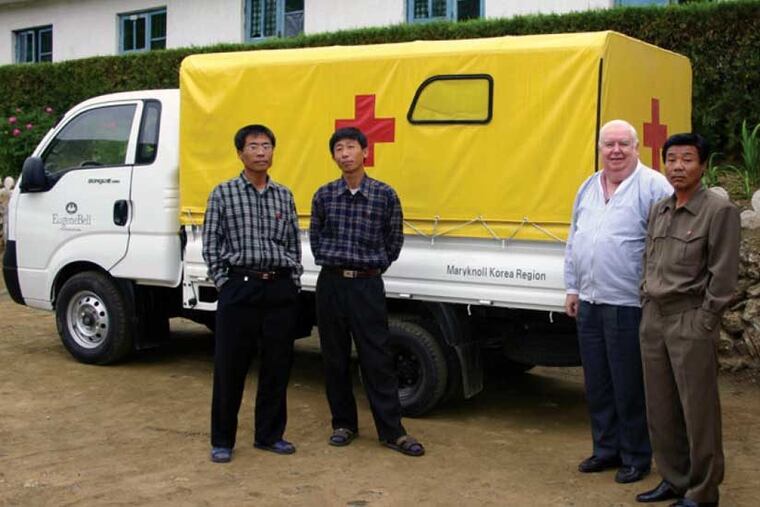From West Philly to North Korea, priest tries to help as tensions rise
For the Rev. Gerard Hammond, 84, a life on the line is a life well lived.

It was a long way from a West Philadelphia rowhouse to the crucible of North Korea, but that's where the Rev. Gerard Hammond found need and meaning.
His mission suddenly became more perilous on Tuesday, when President Trump stood before the United Nations General Assembly and threatened to "totally destroy" the North if the United States is forced to defend itself and its allies.
That followed weeks of rising tensions after Kim Jong Un boasted of detonating a hydrogen bomb and sent missiles splashing into the sea around Japan.
From his church office in Seoul, South Korea, a scant 35 miles from the border, the 84-year-old Catholic priest watches and prays. People have been told to use subway tunnels as bomb shelters if North Korean artillery rains down.
"It looks very bleak right now," Hammond said in a recent phone interview. "They wouldn't even need a nuclear weapon or missiles."
So far, he said, people have generally, edgily gone about their day-to-day business, despite the shadow of annihilation. There's been no rush to stockpile food or bottled water.
At Mass, he said, people pray for the same thing: peace on the peninsula.
Hammond is the regional superior of the Korean mission of Maryknoll, an overseas missionary arm of the Catholic Church. He worries about people on both sides of the border.
He made his first trip into the North in 1995, amid a killing famine, and since then has returned more than 50 times on medical and humanitarian missions.
In the North, Hammond works with the Eugene Bell Foundation, which treats patients infected with multi-drug-resistant tuberculosis — an illness unresponsive to standard medicines. It's a health emergency there.
His efforts haven't gone unnoticed.
Pope Francis personally commended him during a 2014 visit to South Korea. This year the priest received the highest honor bestowed by the Knights of Columbus, the Gaudium et Spes Award, for exemplary service in the spirit of Christ.
Now Hammond is uncertain when or if he'll be permitted to go north. His three-week trip set for Nov. 7, has been blocked by the Trump administration's ban on travel to North Korea.
The president imposed the ban after the death of Otto Warmbier, a 22-year-old university student and tourist. The young man was returned to the United States in a coma after being sentenced to hard labor for trying to steal a propaganda poster from a North Korean hotel.
Three Americans remain captive in North Korea.
The State Department said it may allow Americans to travel there in "extremely limited circumstances" if they are journalists, Red Cross workers, or involved in compelling humanitarian work.
Hammond filed for an exception on that basis, seeking entry to a place where conditions became more uncertain on Tuesday. In his U.N. address, Trump denounced North Korea as a "band of criminals" and its leader as "Rocket Man," bent on a nuclear weapons program.
One danger of higher anxiety is that North Korea might come to believe it faces an imminent attack — and launch a preemptive strike against a U.S. ally, said Christopher Butler, a political scientist at the University of New Mexico, the state where the world's first nuclear explosion took place.
"The rhetoric of the United States, and the weapons tests and missile tests of the North Koreans, are just their way of convincing the other that a direct attack would be a bad choice," Butler said. "One caveat is important: If one side starts to think that war is better than the status quo, or one side thinks that the other prefers war over the status quo, then we're no longer in a deterrence framework."
Hammond never expected to live his life on so fragile a fulcrum.
He grew up in an Irish immigrant household at 6730 Lebanon Ave., in the city's Overbrook section, near Morris Park. Or as he put it, in St. Callistus Parish, not far from Our Lady of Lourdes.
Even as a teenager, he knew he wanted to be a priest — or, at the least, he wanted to help. He was ordained in 1960 and assigned to Korea the same year.
By then, the country had been split in half.
At the close of World War II, the nation lay divided between the Soviet-backed North and the U.S.-supported South. The Korean War that erupted in 1950 — killing millions of Koreans and 36,574 Americans — ended three years later in an armistice, not a peace treaty.
Today the 38th Parallel ranks among the most militarized borders in the world.
While South Korea is a democracy that's home to one of Asia's most vibrant Catholic populations, the North is a dictatorship that bans religion.
Why does Hammond keep going back?
"Where there's suffering, Christ is there," he said. "And if Christ is there, we should be there."
While in the officially atheist North, Hammond is forbidden from even mentioning he's a priest.
He hopes the simple example of his caring presence will move people toward Christ.
"Don't you think a person who is cured is going to tell his family where the medicine came from? And who helped them?" he said. "They say, 'Thanks for giving me life. Thanks for giving me hope.' They can't say more than thank you, but that's enough."
This article contains information from the Associated Press.